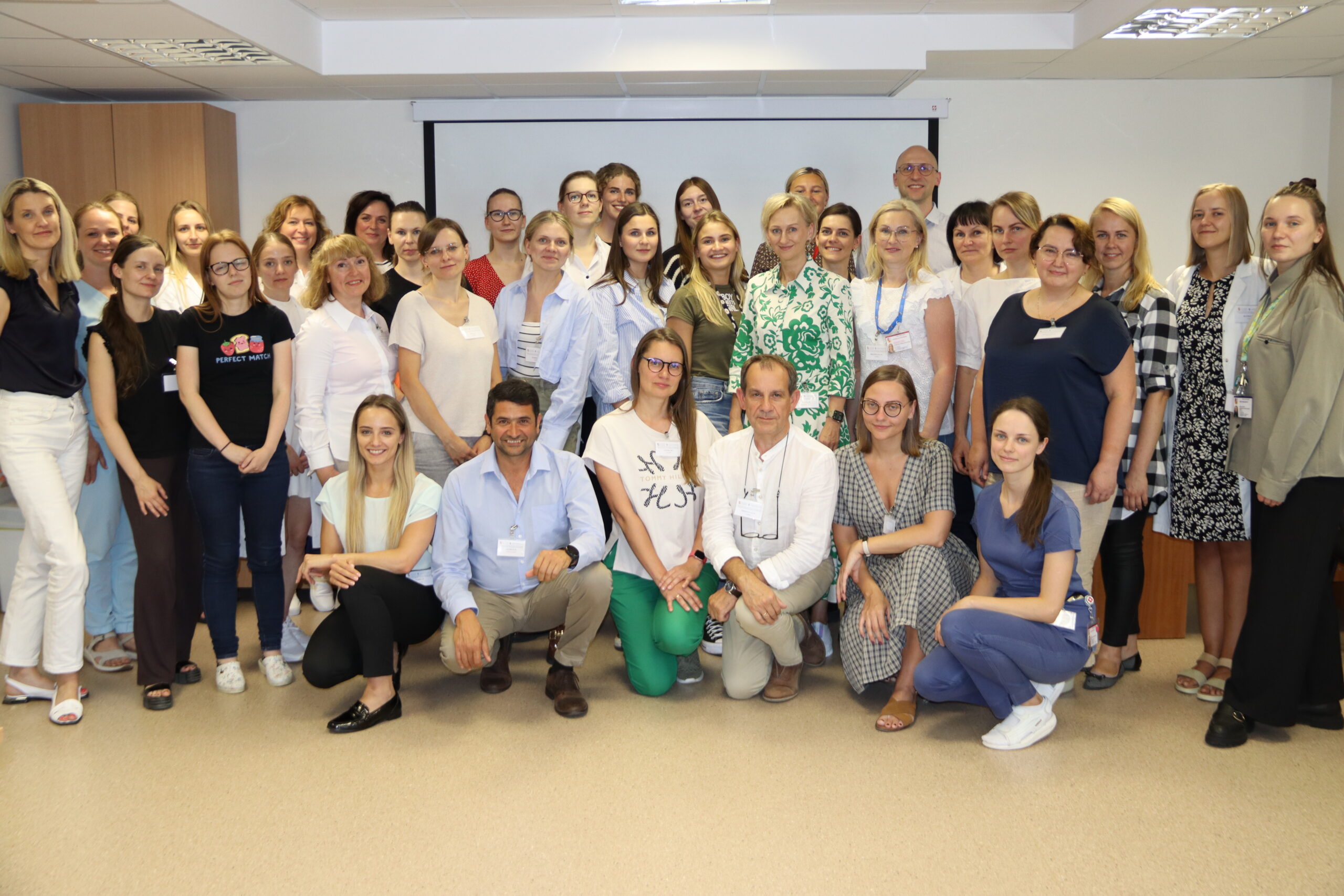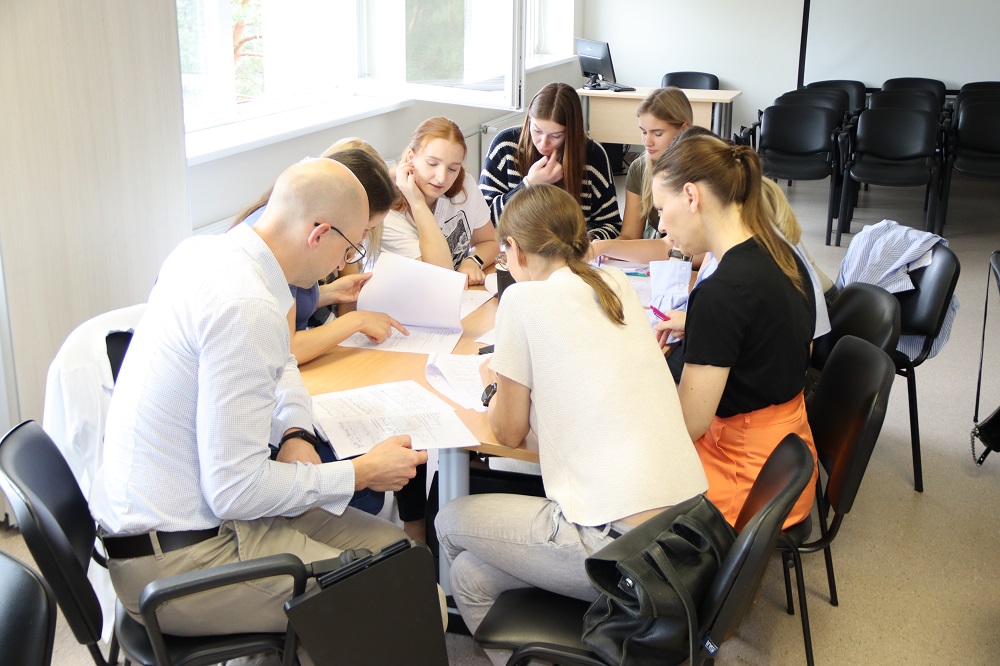LSMU Alumnus George Haroun: “Paying Tribute to My University is a Duty I Embrace”

A few weeks ago, George Haroun, a Lebanese medical doctor and LSMU alumnus visited the Department of Obstetrics and Gynaecology of the Faculty of Medicine (Lithuanian University of Health Sciences, LSMU). The seasoned obstetrician-gynaecologist conducted training for the residents on a variety of topics, including foetal physiology, physiological cardiotocography (CTG) assessments, human factors, and the physiological breech birth delivery.
G. Haroun, who was among the inaugural cohort of international students at LSMU, made his much-awaited return to his Alma Mater 22 years later. He still remembers fondly the teachers and peers he met during his studies and is proud to have graduated from LSMU. Today, he expresses his sense of obligation to pay tribute to his university and says he would be happy to share his knowledge with the younger generation of doctors and midwives more often.
Did you enjoy your experience revisiting your Alma Mater, not as a student this time, but in the capacity of a teacher? Do you have any intentions of making such visits more often in the future?
I have always maintained strong bonds with my colleagues at Kaunas Clinics. Every time I visit Lithuania, I make sure to allocate time to reconnect with my past colleagues. It brings be joy to see many of them flourishing as associate professors, professors, and leaders in high positions. They always welcome me with warmth, and we exchange our experiences and memories of our shared past. Walking into the Department of Obstetrics and Gynaecology evokes a profound sense of nostalgia in me. It is a comforting sensation, akin to being in a familiar, safe place – a feeling that’s hard for me to articulate fully.
My recent visit was not merely a reunion, but rather an opportunity to foster stronger connections and lay the groundwork for a potential future training programme. I harbour a deep sense of responsibility to honour my university for the wealth of knowledge it has shared with me. In return, I can offer my own expertise and experiences. Given my enthusiasm for teaching, I would be more than willing to engage in more frequent knowledge-sharing sessions, should my peers find my insights valuable.

As an LSMU alumnus, could you share how you came to the decision to pursue your studies in Lithuania? Additionally, we’d love to know what factors led you to choose our university.
I take immense pride in being an LSMU alumnus. Prior to my studies here, I had no prior knowledge of your country. During a period of unrest in Lebanon, I saw a newspaper advertisement about opportunities to study medicine in English in the Soviet Union. I promptly registered, passed the entrance examinations, and came here alongside other fellow Lebanese.
LSMU stood out at that time as the pioneering university to offer a medical degree programme in English. Our cohort, comprising 21 students, was Lithuania’s first foreign student group. Our presence, as novel to us as it was to the Lithuanians, was quite an anomaly. Particularly because the prevailing stringent regime severely limited our freedom to travel.
What led you to specialise in gynaecology among all fields of medicine?
Throughout my time as a student, my preferred specialty underwent several transitions. During my fourth year, cardiology captured my interest and I resolved to become a cardiologist. However, by my fifth year, my fascination shifted towards ophthalmology. Yet, upon completion of the obstetrics-gynaecology course, I realized that it was the one field that covered various aspects of medicine encompassing surgery, therapy, and outpatient interventions. This specialty focuses on treating women’s diseases and overseeing both physiological and pathological pregnancies. The profound moment a child’s birth and the indescribable joy mirrored on the parents’ faces made me realise I desired no other career path. While my teaching focus remains primarily on obstetric subjects, I maintain a profound passion for surgical gynaecology. Till this day, I personally undertake all the clinical tasks, and I wouldn’t prefer it any other way.
Is there anything from your academic journey that continues to impact your present-day life?
One significant takeaway from my studies has been the understanding that nothing is simply handed to us. A promising future is a product of substantial sacrifice and earnest effort. The path is seldom smooth unless one has been fortunate enough. Our profession, and our specialty in particular, implies considerable risks. If one chooses the path of medicine, it speaks volumes about their intrinsic qualities, such as selflessness, the instinct to aid others, and a commitment to promoting others’ well-being. The COVID-19 pandemic stands testament to our readiness to make sacrifices for the benefit of others.
Each country I’ve resided in has offered its unique lessons. During my time in Lithuania, I learned that the path to becoming a proficient doctor is always wide open, accompanied by ample help and support. After the graduation and return to Lebanon, I realised the value of self-reliance and confidence in one’s own knowledge and capabilities. Having spent several years now in the UK, I’ve come to appreciate the critical role of teamwork and effective communication.
Can you share a particularly memorable experience from your studies at LSMU?
What stands out vividly in my memory is the invaluable support I received from numerous lecturers, senior doctors, and colleagues. Without their guidance, I doubt I could have accomplished as much as I have today. There are so many of them that I might exhaust the space allotted to this article if I were to list them all. However, I feel compelled to express my deep appreciation for professor V. M. Čigriejienė, the late professor R. Nadišauskienė, and my friend, the late associate professor S. Kajen. Their contributions were instrumental in equipping me with the knowledge, skills, and practical experience that I possess today.
Having graduated in Lithuania, worked in Lebanon, you currently live and work in the UK. How would you assess the Lithuanian medical system and the level of training of LSMU residents in comparison with those countries?
Every country’s health care structure possesses its unique aspects. There isn’t a one-size-fits-all system that would satisfy all – patients, physicians, and officials alike. Lithuania boasts a commendable health care system, offering high-quality care and ranking amongst the top in Europe. However, I have received feedback about long waits for procedures, instances of doctors’ misconduct with patients or colleagues, and cases of bribery.
The UK too encounters similar issues. Despite the hefty government funding, long queues for consultations and procedures persist. There can be waiting times as long as 12 hours at the reception, conditional on the patient’s clinical situation. Nonetheless, the standard of health care ranks among the global best. Doctors’ misconduct or acceptance of bribes are strictly prohibited and heavily penalized, with the risk of losing their licence in cases of bribery.
Lebanon’s health care landscape differs significantly, operating primarily on a private, insurance-based model. Doctors run their private clinics, associating with multiple private hospitals, and provide treatment or perform procedures at these hospitals based on patient requests.
Private hospitals extend services equating to 5-star hotels. Given the intense competition, doctors must maintain high-quality care, smile, and continually enhance their expertise and skills. Wait times aren’t a concern and vary based on the demand for the doctor. However, the need for doctors to be entirely self-reliant can be a downside – if complications arise, help from competitors is unlikely, potentially leading to patient suffering.
For new doctors, the path to financial independence is long, as it takes a considerable time to amass the required patient numbers. Patients who cannot afford treatment or insurance struggle too – they resort to public hospitals where standards are lower.
The fact that I worked in Lebanon for 13 years is testament to the comprehensive preparation provided by LSMU. I operated as an independent doctor, performed both simple and complex procedures, and held a strong knowledge base. I often recommend Lithuania for medical studies to acquaintances, several of whom have graduated or are currently studying here. I take pride in having completed my studies and residency at LSMU.
Do you maintain connections with your former classmates and other LSMU alumni? If yes, are there any plans for future collaborations such as joint projects, events, activities, training, or meetings?
While working in Lebanon, I stayed in contact with a few of my classmates living there. Now, in the UK, I interact more with my Lithuanian colleagues. This summer course is the result of such communication. Discussions about future collaborations have taken place, but they are still in the planning stages. Realizing these plans will require effort, but I believe if the shared interest is there, making it happen won’t be too challenging.
